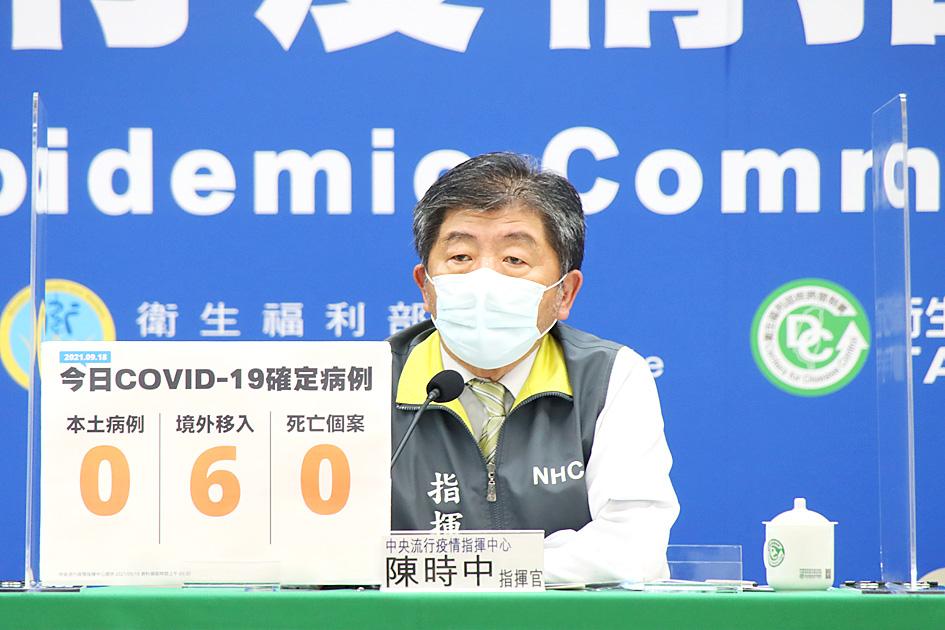A small cluster of COVID-19 infections involving EVA Airways Corp (長榮航空) pilots is under control, while a cluster linked to a preschool has likely run its course, the Central Epidemic Command Center (CECC) said yesterday.
No new cases have been linked to the EVA Airways cluster since two pilots were reported to have the disease on Sept. 3 and the son of one of them was reported as being infected the following day, said Minister of Health and Welfare Chen Shih-chung (陳時中), who heads the center.
A total of 519 people who were listed as contacts of the three were quarantined for 14 days and tested negative for COVID-19, he said.

Photo courtesy of the Central Epidemic Command Center
Chen said it was “case closed” for the small cluster of the Delta variant of SARS-CoV-2.
The Civil Aeronautics Administration on Friday said it had fined the pilot who was found to have spread the disease to his son NT$400,000 (US$14,422).
He was also dismissed from the airline for contravening quarantine protocols.
EVA Airways was fined NT$12 million for its failure to supervise the pilot, the agency added.
Regarding the Delta variant cluster at a preschool and apartment complex in New Taipei City, Chen said it would be clear today if the spread of the disease had run its course.
From Sept. 5 to Thursday, 33 cases were linked to a preschool in the city’s Banciao District (板橋) and a residential building where one of the cases lived, the CECC said.
The cases included 10 children and two staff members from the preschool, as well as relatives, neighbors and people who came into contact with them, it said.
Among the 3,600 people listed as contacts, 3,472 tested negative for COVID-19, while 2,638 people have been quarantined, Chen said.
Once the test results of the last batch of 100 contacts come back today, the CECC would be able to determine whether the cluster was under control, he said.
The clusters were not linked, as the groups contracted genetically distinct versions of the Delta variant, Chen said.
Initial genome sequencing also found that an airplane cabin cleaner at Taiwan Taoyuan International Airport was not infected with the same Delta variant identified in either clusters, he said.
Centers for Disease Control Deputy Director-General Philip Lo (羅一鈞), deputy head of the CECC’s medical response division, said that health authorities have identified the aircraft the cleaner worked on, which carried one or two imported cases of COVID-19 from the Middle East earlier this month.
While no new local cases were reported, Chen said that the public should remain vigilant during the four-day Mid-Autumn Festival holiday, which began yesterday.
The CECC reported six new imported COVID-19 cases. They are two Taiwanese returning from the Philippines, and three Indonesians and one Bangladeshi traveling from their respective countries.

MAKING WAVES: China’s maritime militia could become a nontraditional threat in war, clogging up shipping lanes to prevent US or Japanese intervention, a report said About 1,900 Chinese ships flying flags of convenience and fishing vessels that participated in China’s military exercises around Taiwan last month and in January have been listed for monitoring, Coast Guard Administration (CGA) Deputy Director-General Hsieh Ching-chin (謝慶欽) said yesterday. Following amendments to the Commercial Port Act (商港法) and the Law of Ships (船舶法) last month, the CGA can designate possible berthing areas or deny ports of call for vessels suspected of loitering around areas where undersea cables can be accessed, Oceans Affairs Council Minister Kuan Bi-ling (管碧玲) said. The list of suspected ships, originally 300, had risen to about 1,900 as

Right-wing political scientist Laura Fernandez on Sunday won Costa Rica’s presidential election by a landslide, after promising to crack down on rising violence linked to the cocaine trade. Fernandez’s nearest rival, economist Alvaro Ramos, conceded defeat as results showed the ruling party far exceeding the threshold of 40 percent needed to avoid a runoff. With 94 percent of polling stations counted, the political heir of outgoing Costa Rican President Rodrigo Chaves had captured 48.3 percent of the vote compared with Ramos’ 33.4 percent, the Supreme Electoral Tribunal said. As soon as the first results were announced, members of Fernandez’s Sovereign People’s Party

MORE RESPONSIBILITY: Draftees would be expected to fight alongside professional soldiers, likely requiring the transformation of some training brigades into combat units The armed forces are to start incorporating new conscripts into combined arms brigades this year to enhance combat readiness, the Executive Yuan’s latest policy report said. The new policy would affect Taiwanese men entering the military for their compulsory service, which was extended to one year under reforms by then-president Tsai Ing-wen (蔡英文) in 2022. The conscripts would be trained to operate machine guns, uncrewed aerial vehicles, anti-tank guided missile launchers and Stinger air defense systems, the report said, adding that the basic training would be lengthened to eight weeks. After basic training, conscripts would be sorted into infantry battalions that would take

GROWING AMBITIONS: The scale and tempo of the operations show that the Strait has become the core theater for China to expand its security interests, the report said Chinese military aircraft incursions around Taiwan have surged nearly 15-fold over the past five years, according to a report released yesterday by the Democratic Progressive Party’s (DPP) Department of China Affairs. Sorties in the Taiwan Strait were previously irregular, totaling 380 in 2020, but have since evolved into routine operations, the report showed. “This demonstrates that the Taiwan Strait has become both the starting point and testing ground for Beijing’s expansionist ambitions,” it said. Driven by military expansionism, China is systematically pursuing actions aimed at altering the regional “status quo,” the department said, adding that Taiwan represents the most critical link in China’s